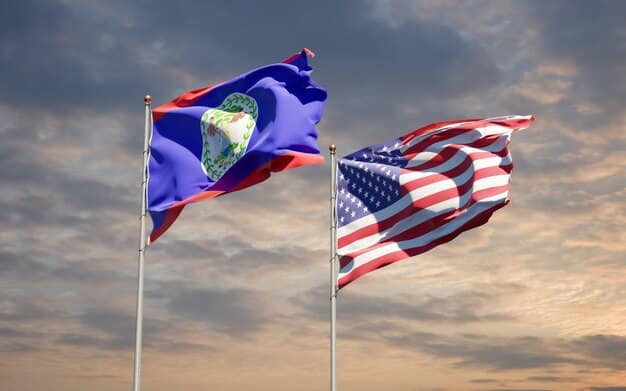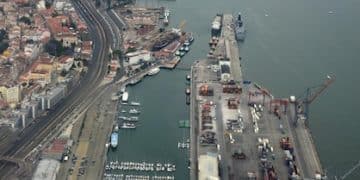Peru’s Constitutional Reforms: Impact on US Business Interests

Analyzing the Potential Impact of Peru’s Proposed Constitutional Reforms on US Business Interests involves understanding the potential shifts in legal frameworks, investment climates, and trade relationships that these reforms could bring about, alongside assessing how they may affect US companies operating in or planning to invest in Peru.
Peru is currently contemplating significant constitutional reforms, and it’s crucial to understand how these changes could reshape the landscape for international business, particularly for US companies. This article delves into analyzing the potential impact of Peru’s proposed constitutional reforms on US business interests, offering a balanced view of potential risks and opportunities.
Understanding the Proposed Constitutional Reforms in Peru
Peru’s proposed constitutional reforms are extensive and could significantly alter the nation’s political and economic structures. These reforms, driven by various socio-political factors, necessitate a thorough examination to gauge their potential impact on international business.
Key Areas of Reform
The proposed reforms span several critical areas, each capable of influencing US business interests in different ways. Understanding these key areas is vital for any business with ties to Peru.
- Economic Policy Changes: Proposed amendments could reshape fiscal policies, impacting taxation and investment incentives for foreign companies.
- Resource Nationalization: Reforms may give the state greater control over natural resources, potentially affecting US mining and energy investments.
- Labor Laws: Changes to labor regulations could affect operational costs and human resource management for US businesses operating in Peru.
The current political climate in Peru contributes to the push for these reforms, fueled by discontent over inequality and resource distribution. This complex interplay of factors makes understanding the potential outcomes all the more critical.

Impact on US Investments in Key Sectors
US companies have significant investments in key sectors of the Peruvian economy. Therefore, analyzing the potential impact of Peru’s proposed constitutional reforms on US business interests requires looking closely at how these investments could be affected.
Mining, energy, and agriculture are primary sectors where US investments are prevalent. The proposed reforms could introduce new regulations, taxes, or nationalization policies that significantly impact these industries.
Potential Challenges
Several challenges could arise from these reforms, affecting the profitability and stability of US investments.
- Increased Regulatory Burden: New regulations could increase compliance costs and operational complexities for businesses.
- Risk of Expropriation: Reforms promoting resource nationalization could lead to the government taking over US assets.
- Policy Uncertainty: The unpredictable nature of constitutional changes can deter new investments and destabilize existing operations.
US companies need to assess their vulnerability and develop mitigation strategies to navigate the evolving regulatory landscape in Peru. This proactive approach is essential for safeguarding their investments and ensuring continued operations.
Trade Relations Between the US and Peru
Trade relations between the US and Peru are governed by various agreements, including the US-Peru Trade Promotion Agreement (PTPA). Constitutional reforms could potentially affect these agreements, leading to changes in trade dynamics.
The PTPA has facilitated significant trade between the two countries, but reforms that alter Peru’s economic policies could create barriers to trade, impacting US exports and imports.

Possible Scenarios
Several scenarios could unfold, depending on the nature and implementation of the reforms. Understanding these possibilities is crucial for US businesses involved in trade with Peru.
- Renegotiation of Trade Agreements: Peru might seek to renegotiate existing trade agreements, potentially impacting tariff rates and trade terms.
- Increased Protectionism: Reforms favoring local industries could lead to protectionist measures, limiting access for US goods and services.
- Supply Chain Disruptions: Changes in regulations could disrupt supply chains, affecting the timely delivery of goods and increasing costs.
US businesses must closely monitor the progress of the reforms and assess their potential impact on their trade operations. Engaging with policymakers and industry associations can help shape trade policies that benefit both countries.
Political Stability and Governance in Peru
Political stability and good governance are crucial for a favorable investment climate. Constitutional reforms can either strengthen or undermine these elements, impacting investor confidence and business operations.
The reforms could lead to greater political polarization, social unrest, and institutional instability, all of which can negatively affect US business interests.
Governance Challenges
Governance challenges arising from the reforms could create additional hurdles for US companies operating in Peru.
- Weakening of Institutions: Reforms that weaken checks and balances could increase corruption and reduce the rule of law.
- Increased Bureaucracy: Changes in administrative structures could lead to bureaucratic inefficiencies and delays in approvals and permits.
- Social Unrest: Reforms perceived as unjust or unfair could trigger social unrest, disrupting business operations and supply chains.
US businesses need to assess the potential impact on political stability and governance and develop strategies to mitigate risks. This includes engaging with local communities, promoting corporate social responsibility, and advocating for transparent and accountable governance.
Legal and Regulatory Environment for US Businesses
The legal and regulatory environment is a critical factor for US businesses operating in Peru. Constitutional reforms could significantly alter this environment, impacting compliance, dispute resolution, and intellectual property rights.
The proposed reforms might introduce new laws and regulations that create uncertainty and increase compliance costs for US companies. Changes could also affect contract enforcement and the protection of intellectual property rights.
Key Legal Considerations
Several key legal considerations need to be taken into account when analyzing the potential impact of Peru’s proposed constitutional reforms on US business interests.
Reforms impacting property rights could lead to uncertainty regarding land ownership and resource extraction. Changes to labor laws could affect employment contracts and collective bargaining agreements.
- Contract Enforcement: The ability to enforce contracts is crucial for business operations; reforms affecting judicial independence could undermine contract enforcement.
- Intellectual Property Rights: Changes in intellectual property laws could impact the protection of patents, trademarks, and copyrights.
- Investment Protection Treaties: Peru’s treaties with the US provide certain protections for US investments; reforms could affect these protections.
US businesses need to closely monitor the legal and regulatory changes and seek expert legal advice to ensure compliance and protect their interests. This includes reviewing contracts, updating compliance programs, and engaging with policymakers to advocate for a stable and predictable legal environment.
Strategies for US Businesses to Navigate the Reforms
To effectively navigate the potential challenges and capitalize on opportunities, US businesses need to develop comprehensive strategies for analyzing the potential impact of Peru’s proposed constitutional reforms on US business interests.
These strategies should include risk assessments, stakeholder engagement, and diversification of investments to mitigate potential losses.
Proactive Measures
Taking proactive measures is essential for US businesses to adapt to the changing landscape.
- Risk Assessment: Conduct thorough risk assessments to identify potential vulnerabilities and develop mitigation plans.
- Stakeholder Engagement: Engage with government officials, industry associations, and local communities to understand their concerns and build relationships.
- Diversification: Diversify investments across different sectors and regions to reduce exposure to specific risks.
By taking these proactive measures, US businesses can enhance their resilience and ensure long-term success in Peru. Effective communication, adaptive strategies, and a commitment to ethical and sustainable business practices will be key to navigating the evolving landscape.
| Key Point | Brief Description |
|---|---|
| ⚠️ Economic Policy Changes | Reforms could alter taxation and investment incentives for US companies. |
| ⛏️ Resource Nationalization | State could gain greater control over natural resources, impacting US investments. |
| 🤝 Trade Relations | Reforms might affect trade agreements and create trade barriers. |
| ⚖️ Legal Environment | Changes to laws could increase compliance costs and affect contract enforcement. |
FAQ
▼
The primary goals include addressing social inequalities, redistributing wealth, and increasing state control over natural resources. These reforms aim to reshape Peru’s economic and political landscape.
▼
US businesses may face increased regulatory burdens, potential expropriation risks, and uncertainties regarding trade relations. Careful monitoring and strategic adaptation are essential for navigating these changes.
▼
Key sectors such as mining, energy, and agriculture are likely to be significantly impacted due to potential nationalization policies and regulatory changes. Diversification may mitigate these risks.
▼
US businesses should conduct thorough risk assessments, engage with stakeholders, diversify investments, and seek expert legal advice to ensure compliance and protect their interests in Peru.
▼
Trade relations could be affected through renegotiation of agreements or increased protectionism, potentially impacting tariff rates and trade terms. Monitoring these developments is crucial for trade-dependent businesses.
Conclusion
Analyzing the potential impact of Peru’s proposed constitutional reforms on US business interests reveals a complex interplay of risks and opportunities. By understanding the reforms, assessing their potential impacts, and developing proactive strategies, US businesses can navigate the evolving landscape and ensure long-term success in Peru. Staying informed and engaged is key to mitigating risks and capitalizing on emerging opportunities.





